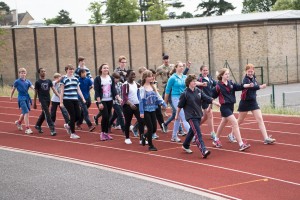 Oundle School’s annual Second Form (Year 8) Culture Week, which this year took place at the end of June, is a cross-curricular initiative, linking areas such as literature, music, art, drama, film, philosophy, science and the world around us all. This year’s theme for the week was Echoes of War.
Oundle School’s annual Second Form (Year 8) Culture Week, which this year took place at the end of June, is a cross-curricular initiative, linking areas such as literature, music, art, drama, film, philosophy, science and the world around us all. This year’s theme for the week was Echoes of War.
Director of Studies, Ben Evans, commented, “We hope to break down the barriers between individual subjects and instead allow the pupils to explore and learn within a framework that is unconstrained by syllabus and exams.”
During Culture Week 2015, Second Form pupils did not attend School lessons but were instead split into groups and enjoyed a variety of activities including watching old School film footage taken between 1911 and 1914. Photographs, folders of letters and artefacts collected and preserved over the years were available for the groups to explore and learn about what School was like at this time. Following on from the workshop there was an opportunity for the pupils to enter the Archive competition “Write a letter from a pupil to an Old Oundelian at the front”. Even though School life carried on at Oundle during the war, the effects of those five years were felt by the whole School community. The then Headmaster, Mr FW Sanderson, would stand up in Chapel and read out the names of the Old Boys or Masters who had been killed in action that week, letters were received detailing the horrors of the fighting and Schoolboys worked tirelessly in the workshops producing munitions for the war effort.
‘Drill is a pill to be taken twice a day’ – Oundle’s very own Sergeant Major Williams offered a taste of the Drill that Oundelians learned 100 years ago on their way to war. By contrast, a war poetry session explored the variety of ways in which war has been addressed in poetry, ranging from its use as a propaganda tool to a reflection upon the horrors experienced. Pupils read, discussed and analysed the poetry, before being invited to write something of their own. Following the Philosophy for Children (P4C) model, pupils were also invited to explore this topic through discussion and debate. Topics included the concept of the ‘just war’, pacifism and the future of conflict provoking discussion and thought, and ensuring that all group members had a chance to have their say.
Using music to explore the theme further, the Second Form recently performed songs from World War I at the Take Two Concert on 21st June as a massed choir. They put these into context during Culture Week through a study of the musical film ‘Oh what a lovely war’ directed by Richard Attenborough. They also watched Aces High, based on R C Sherriff’s 1928 play Journey’s End. The play is set in the trenches of France during the last days of the war, but Aces High transfers the action to the skies. The film also takes inspiration from Sagittarius Rising, the WWI memoirs of Old Oundelian Cecil Lewis.
Pupils also had the the opportunity to create their own war recruitment posters, inspired by those used to persuade Britons to enlist one century ago. Indeed one of the highlights of Culture Week was a visit to the Imperial War Museum at Duxford. As well as having a chance to explore the museum, pupils took part in two workshops:
- Trench Warfare: ‘The session covered the reasons behind young men joining up to fight for their country, the uniforms they wore, life in the trenches, the difference between propaganda and reality, weapons, aerial warfare and the legacy of the First World War. During the session, pupils had access to both genuine and replica artefacts from the First World War.’
- Creative and Destructive Forces: ‘Pupils found out how an aeroplane wing can dry your hands, how a melting chocolate bar led to the invention of the microwave oven and how technological developments used in weapons of war led to everyday commercial and social applications. The tour showcased key artefacts of aviation and military history, and include interactive handling of selected collection pieces.’